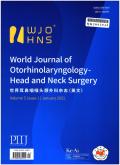Is posterior nasal neurectomy the definitive treatment for intractable allergic rhinitis: A prospective study
Q2 Medicine
World Journal of OtorhinolaryngologyHead and Neck Surgery
Pub Date : 2023-10-10
DOI:10.1002/wjo2.133
引用次数: 0
Abstract
Abstract Objectives Allergic rhinitis (AR) has a significant effect on the quality of life and accounts for unproductive times at work and school, causes disturbed sleep patterns and can lead to daytime somnolence. It is fairly prevalent in the world with medical management still being the mainstay of treatment. Patients suffer for a significant number of years before they undergo surgical management for their intractable rhinitis. Thus, this prospective observational study was conducted to reinforce the proficiency of posterior nasal neurectomy in being an effective method for ending this suffering. Methods Thirty patients with troublesome intractable rhinitis underwent posterior nasal neurectomy. Pre‐ and postoperative Visual Analogue Scale (VAS) and Rhinoconjunctivitis Quality of Life Questionnaire (RQLQ) scores were compared to study the improvement in nasal and ocular symptoms. Each domain of these scores was studied separately. Results The mean reduction in the VAS was from 6.76 ± 0.884 preoperatively to a mean of 5.33 ± 0.675 at 1 month, 3.81 ± 0.462 at 3 months and 2.53 ± 0.405 at 6 months postoperatively. The mean RQLQ score was reduced from preoperative 4.22 ± 1.091 to a mean of 3.82 ± 1.072 at 1 month, 3.55 ± 1.063 at 3 months and 3.18 ± 1.173 at 6 months postoperatively. Thus, a statistically significant improvement was seen in both mean VAS and RQLQ scores ( P < 0.001), and also when each domain was compared separately. Conclusion Endoscopic posterior nasal neurectomy may be an effective way of improving symptoms in patients with intractable AR and freeing them from long‐term medical regimes, thereby improving their quality of life.鼻后神经切除术是顽固性变应性鼻炎的最终治疗方法吗:一项前瞻性研究
过敏性鼻炎(AR)对生活质量有显著影响,导致工作和学习时间不高效,导致睡眠模式紊乱,并可能导致白天嗜睡。它在世界上相当普遍,医疗管理仍然是治疗的主要手段。患者在接受顽固性鼻炎的手术治疗之前要忍受相当长的时间。因此,本前瞻性观察研究旨在加强后鼻神经切除术作为结束这种痛苦的有效方法的熟练程度。方法对30例顽固性鼻炎患者行鼻后神经切除术。比较术前和术后视觉模拟量表(VAS)和鼻结膜炎生活质量问卷(RQLQ)评分,研究鼻部和眼部症状的改善情况。对这些分数的每个域分别进行了研究。结果VAS评分从术前的6.76±0.884降至术后1个月的5.33±0.675,3个月的3.81±0.462,6个月的2.53±0.405。RQLQ评分从术前的4.22±1.091降至术后1个月的3.82±1.072,术后3个月的3.55±1.063,术后6个月的3.18±1.173。因此,平均VAS和RQLQ评分均有统计学显著改善(P <0.001),当每个域分别比较时也是如此。结论内镜下鼻后神经切除术可能是改善顽固性AR患者症状的有效方法,使其摆脱长期的医疗制度,从而改善其生活质量。
本文章由计算机程序翻译,如有差异,请以英文原文为准。
求助全文
约1分钟内获得全文
求助全文
来源期刊

World Journal of OtorhinolaryngologyHead and Neck Surgery
Medicine-Otorhinolaryngology
CiteScore
4.10
自引率
0.00%
发文量
283
审稿时长
13 weeks
 求助内容:
求助内容: 应助结果提醒方式:
应助结果提醒方式:


